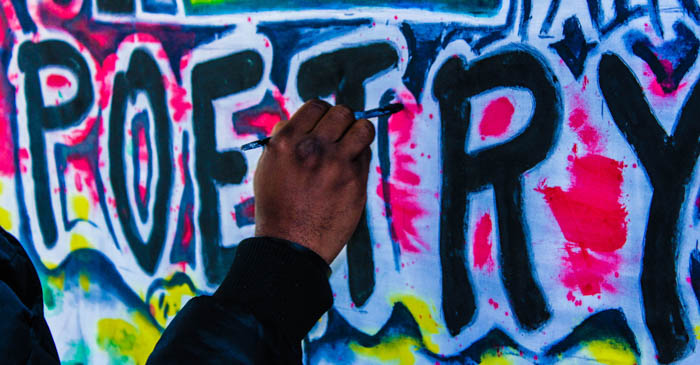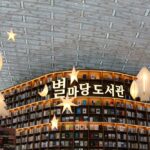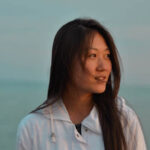For readers interested in what contemporary Korean American poets have been up to, this post includes three longer features and three very brief features of new and recent Korean American works of poetry. Pick up these books to check out how these six Korean American poets have been playing with and working through language in stunning feats of artistry and intellect.
origin story by Gary Jackson
In Gary Jackson’s intimate second poetry collection origin story, the poet explores family, memory, and distance. As a whole, the work provides a splintered family with substantive and meaningful representation through Jackson’s sustained attention to the weight of absence and the longings of separation.
The poet’s mother is of central importance to the collection. The book is divided into five sections, each of which ends with “Interview featuring…” poems. Jackson explains that these poems are taken from recorded conversations between the poet and his mother as they looked at old photos in 2010. Jackson lists six formal constraints that determine the shapes that these poems take on, and these rules determine how the poet styles and trims the source material, leading to “[c]aesuras and line endings [that] may signal an omission of just one word, or pages of text.”
The resulting “Interview featuring…” poems look like short phrases and words that float around the page. While these poems’ many white spaces introduce suggestive rests and pauses, they also raise the question of what, exactly, has been cut from his and his mother’s speech to achieve his mission of “[preserving] clarity and the music of my [his] mother’s voice.” The collagelike products we’re left with seem to precipitate repressed patterns of trauma and violence that would have otherwise remained hidden.
The collection’s poems evoke rich moods, emotions, and tones, but, when taken individually, are at first vague and disorienting. Settings are located all over the US and in Korea at often unspecified times. Furthermore, the speakers of the poems are not always named, nor are the referents of pronouns always specified, so it can be difficult to determine who’s who.
Jackson’s uses of the pronouns “me” and “you” are particularly fraught with sparkling ambiguity. Sometimes the “me” is the poet; sometimes he’s the “you”; sometimes he’s both or neither. Through this pronominal obscurity, the “mes” and “yous” of the collection become more expansive.
For example, the many “yous” of the collection often interpellate the reader as a witness to striking effect, as in the poignant final lines of the book, found in the poem “Interview featuring thanksgiving”:
I think about them it’s too bad they didn’t get to live to see who has? you me
Here the “you” contains the superposition of the reader on the poet. The proximity of the reader and the poet within the second-person pronoun highlights the contextual imprecision of the word “you” while simultaneously implicating the reader in the poet’s mission to bear witness to his mother’s voice and story.
While precise details in individual poems may be fuzzy—if meaningfully so—the poems coalesce within the context of the whole poetry collection, forming the greater picture of a man piecing together a sweeping, recuperative family portrait marked by distance, estrangement, and absence.
As the reader makes their way through the collection, impressions of characters start to come into focus, and events in their lives start to stick. It is ultimately the tender likenesses of the poet’s family members that tie the poems together, but Jackson’s poetic style also helps the poems resonate with one another.
Most of Jackson’s other poems are not as explicitly engaged with the poetics and politics of white space as the “Interview featuring…” poems, though the poet does regularly make use of devastating line breaks, as seen in the lines “and when she passes / back the phone” from the poem “Reunion,” in which the intransitive “passes” of death lingers for a moment before becoming the mundane, transitive phrase “passes back the phone,” like a sigh of relief.
Symbols like alcohol and honey also recur throughout the collection, forming links among the work’s disparate poems. Alcohol in particular becomes a load-bearing vehicle that gathers together some of the poet’s many thoughts on masculinity, misogyny, alcoholism, and Black/Korean/American identities.
Readers who pick up Jackson’s book will find a memorable collection of poetry that dramatically unveils its subjects and their relationships to each other through fragmented lyrical reflections. Overall, origin story amounts to a breathtaking work that benefits from multiple readings, as it gradually reveals itself to the reader with measured restraint.
Fablesque by Anna Maria Hong
In Fablesque, Anna Maria Hong’s second poetry collection, the poet cultivates language both new and old to shed light on contemporary problems. According to Don Mee Choi, the collection specifically “explores the grammar of horror and hunger, survival and abuse across the contorted historical, cultural, and familial terrains of the Korean diaspora.”
As the title suggests, fables are a key concern of the collection, and the many fables in Fablesque enchant and reorient human concerns such as those enumerated by Choi by housing them in zoological and mythological frames.
In the opening poem, “Heliconius Melpomene,” the optical, mimetic evolutionary adaptations of the postman butterfly are compared with the poet’s father’s trauma in Korea. In “Siren,” the poet writes that the titular mythological being has the following “Goals for a Monday: / —rip out the knees of the patriarchy / —practice histrionic but alluring singing / —do laundry.”
As seen in both of these examples, Hong’s poetics fuses distinct themes and topics together to generate entirely new perspectives. On this note, Eric Stiefel writes that Fablesque “[bends] folklore and convention to reimagine trauma, to recontextualize real-world suffering into fable and breathe life into the world of fairytale so that it, too, can speak to living in the world today.” This gesture gives more meaning to the “-esque” in “Fablesque.”
Nevertheless, throughout Fablesque, Hong’s poems are formally diverse, and they deftly critique, appropriate, and play with the baggage that the different poetic forms bring with them. Regarding the lofty sonnet, David Epstein highlights Hong’s deep engagement with and virtuosic treatment of poetic form, specifically remarking that “[i]n Hong’s sonnets we feel the entire rolling comber of the history of the poem, while she performs her pirouettes on the foam-fleck lip of the breaking wave.”
Fablesque won Hong the 2017 Berkshire Prize for a First or Second Book of Poetry. Check out this work for a poetry collection that, according to Leslie Wheeler, compellingly tackles “disguise, hybridity, identity, and many kinds of transgression, some destructive and others empowering”
The Curious Thing by Sandra Lim
The Curious Thing, Sandra Lim’s third poetry collection, is an introspective work in which “writing reads as the main event.” Divided into three sections, Lim’s work lyrically explores the desires for love, the past, and writing.
Aria Aber reads in The Curious Thing a “literary commitment to feminine interiority, a specifically gendered solitude.” As Aber argues, the feminine in Lim’s work emerges from the encounter between a masculine, mathematical mode of rationality and a feminine, lyrical mode of poeticity.
Within Lim’s work, the romantic relationship and misunderstandings depicted between the writerly woman speaker and her mathematician man lover dramatize this gendering of thought and expression. If math becomes a metaphor for a masculine desire for clarity while poetry becomes a metaphor for a feminine embrace of uncertainty, then The Curious Thing—particularly as a work of poetry itself—sides with the latter while elevating the epistemic value of feminine forms of knowing.
However, these two poles may not be mutually exclusive, as Lim herself allows for an interpretation of subjectivity that lies outside of overarching dualisms. The poet notes in an interview with McSweeney’s that:
there’s no competition between certainty and states of feeling and being; instead of trying to control the outcome, the poem’s speaker is alert to trade-offs, comedy, defensiveness, appetites. In this light, I consider the self as continuous but not intrinsically one thing or another: perhaps I think of the self as the mind’s internal confrontations with itself and with life.
According to Lim, the self is more porous than it is self-contained, aware of and desiring both clarity and uncertainty. To that effect, Aumaine Rose Smith writes that what is “[m]ost affecting to me [her] about The Curious Thing is its poems’ consistent longing for, attempt to secure, and tendency to distrust clarity.” Even when clarity cannot be wholly trusted, there is nonetheless desire for and action towards it.
The Curious Thing is a thoughtful and self-conscious work on psychoanalysis, art, and memory. It would be a great read for those interested in philosophical poetry and the cerebral journeys that artists undertake as they shuttle between life and the page.
Three More Books of Poetry
Here are three additional Korean American books of poetry that you should check out!
Connotary by Ae Hee Lee
“Each poem shimmers as the poet investigates the endless relationship to family and language. Korean, Spanish, and English are braided throughout the chapbook as the speaker in these poems negotiates the idea of home in what we lose, gain, carry, pass down, and offer up inside the various translations.” — Tiana Clark
Claim Your Space by Minyoung Lee
“Through a series of evocative and rich vignettes, Claim Your Space tells the classic coming-of-age story using experimental narrative that plays with time, memory, and space.”
sur vie by Youna Kwak
“sur vie contemplates survival, this life we live and try in vain to make sense of, in all its estranging detachment and its thrumming intimacies. Youna Kwak’s poetry, ‘moonbitten, lit, a tatter of telegrams,’ counters what Pound called ‘the tyranny of the unimaginative.’” — Dante Di Stefano

















